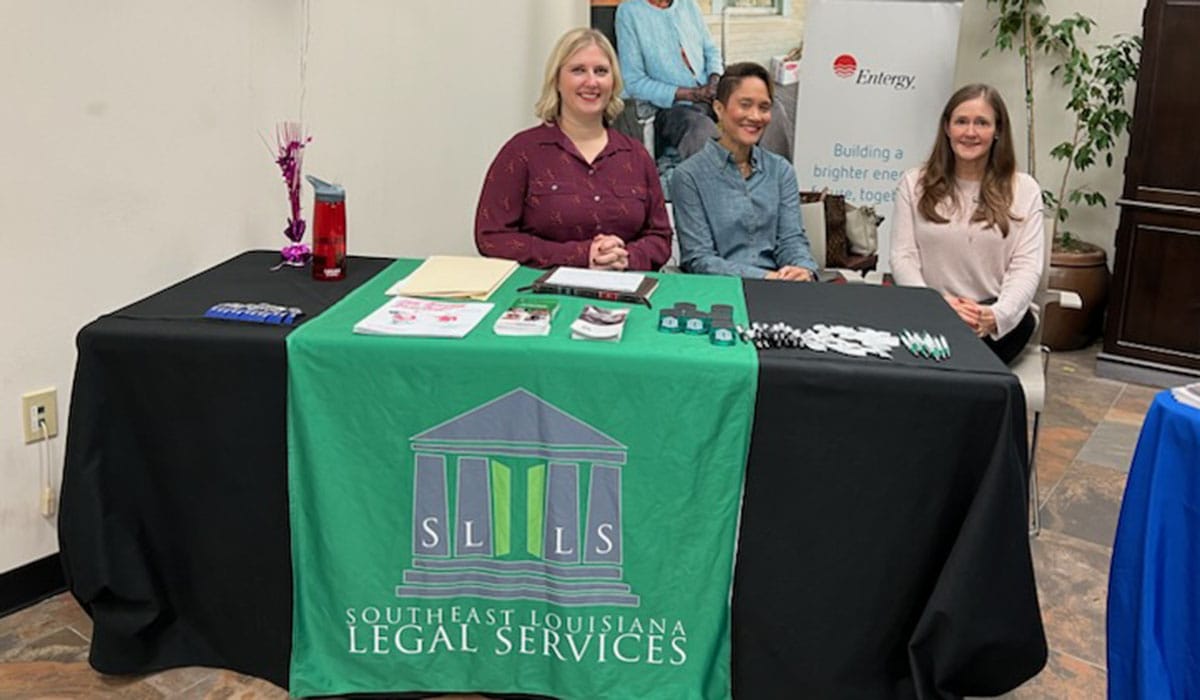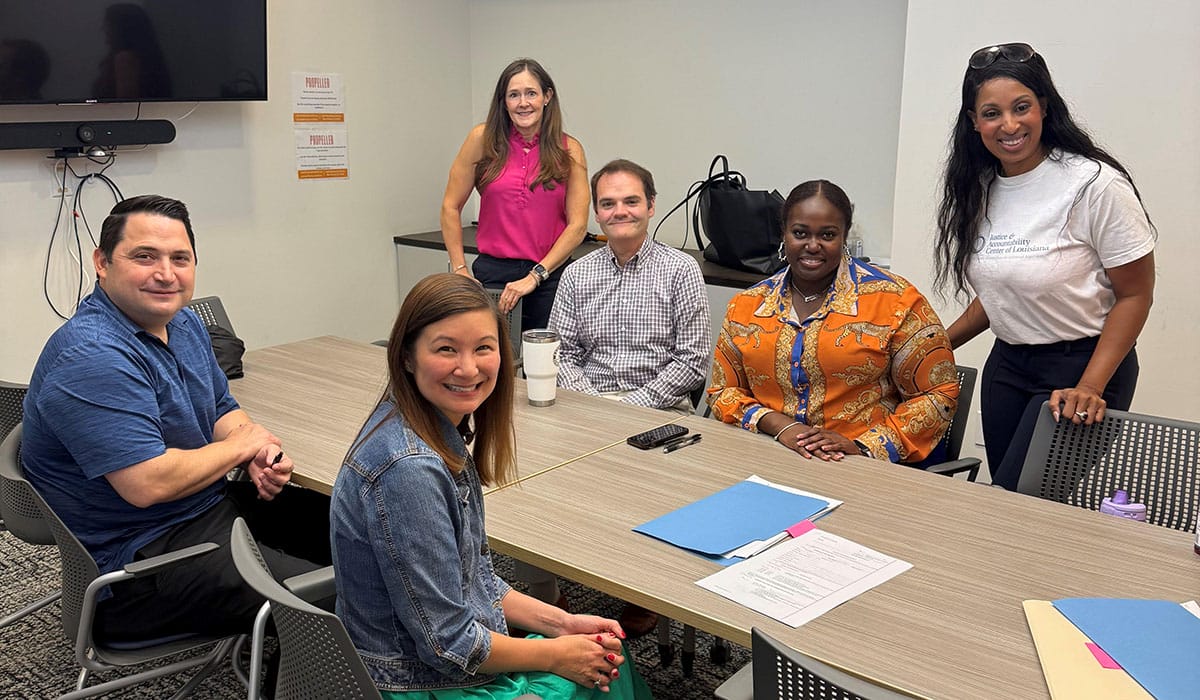Attorney Delivers Free Legal Aid in Life’s Toughest Moments

Meet Daily Point of Light Award honoree Christy Kane. Read her story and nominate an outstanding volunteer or family as a Daily Point of Light.
As pro bono counsel for Entergy’s Legal Department, Christy Kane spends her days mobilizing attorneys and staff across five states to provide free legal help to those who need it most. In addition to leading the company’s pro bono program, she regularly volunteers herself—logging dozens of volunteer hours each month to support individuals and nonprofits navigating life’s most overwhelming legal challenges. Whether she’s walking someone through the divorce process, helping a family draft their first will or offering clarity at a courthouse help desk, Christy approaches each person with empathy and a desire to lighten their burden.
Based in New Orleans, Christy has been committed to pro bono legal work since the late 1990s and has built a career grounded in public service. She doesn’t measure her impact in case numbers—in fact, she’s never kept track of how many people she’s helped—but in the quiet, meaningful moments when a client leaves feeling seen and at peace.
She believes professional skills are meant to serve others, and she leads by example, showing how lawyers and business professionals alike can make a lasting difference, one conversation, one document, one person at a time.
Tell us about your role with Entergy.
Entergy is an electricity company that provides power to millions of customers across Louisiana, Mississippi, Arkansas and Texas, with an additional office in Washington, D.C. I serve as Entergy’s pro bono counsel, which means I’m an attorney in the legal department, but my full-time role is managing and directing our pro bono practice.
Our legal team includes about 150 professionals—roughly half attorneys, half staff—and together we contribute around 5,000 volunteer hours a year. My focus is on legal pro bono, helping low-income individuals and nonprofits access free legal support. Most of my own pro bono service is in Louisiana, since that’s where I’m licensed, but I also support projects in our other jurisdictions.
Outside of coordinating the program, I also participate directly—volunteering at legal clinics, helping with policy research and working one-on-one with clients. A lot of that is in partnership with legal aid or pro bono-focused organizations.
What inspired you to start doing pro bono work?
I started out at a law firm in New Orleans called Adams and Reese in the mid-90s. They had a really active volunteer program that included legal pro bono, and that was my first exposure to it. I realized I could use my legal skills to help people in the community, and that really stuck with me.
I feel like anyone who’s trained in a profession that can help others has a heightened responsibility to pay it forward. For lawyers, the American Bar Association suggests 50 hours of pro bono work a year. At Entergy, we ask our legal professionals to do at least 10 hours of volunteer work, and we really encourage them to focus on legal pro bono because the things that we do every day for a Fortune 500 company, those skills can really help members of our community.

What kinds of clients do you usually work with?
The people we help are often facing significant challenges. A large portion of Entergy’s customer base falls at or near the poverty line, so the need is great in our community. A lot of my hours come from legal clinics. I go to places where a nonprofit sets up appointments or opens its doors to help people with urgent legal issues.
One example—last week I was at a divorce workshop. People came in needing help completing their divorce paperwork. Other times I volunteer at a self-help resource desk at the courthouse for folks who are representing themselves. We help them find the right forms, provide information about the process and connect them with any available resources. Most of the needs in legal aid are in family law—divorce, custody, name changes, adoptions. Those kinds of life events really matter, and even if it doesn’t take a lot of my time, it can make a huge difference for the client.
Is there a moment that stands out to you?
One of my favorite experiences was a will-generating clinic we did in the Lower Ninth Ward of New Orleans. It was around the time of the Super Bowl, and a bunch of companies, including Entergy, were hosting volunteer events. We partnered with a nonprofit and set up a community center where people could come in and leave with a completed will. I did some training ahead of time because I don’t draft wills in my day-to-day job, but I was able to sit with people, talk through their wishes and help them walk out with something important and concrete.
There was one man working the front desk at the center. He had helped me find where I needed to go that morning, and later someone said, “Hey, he realized what you’re doing, and he’s been meaning to get a will done—would you be willing to help him?” So, I said, absolutely. He didn’t have an appointment, but we sat down together, and when we were done, he said he was so excited to go home to his wife that night and show her that he had finally taken care of something that meant a lot to their family. That really meant a lot to me, too.
You work with people going through some of life’s most difficult moments. How do you approach that?
I think it’s about coming in with compassion and sensitivity. I’ve experienced grace in my life, and I think a lot of us have. When someone treats you with dignity and makes something that felt overwhelming a little easier, it just makes such a difference.
What’s the most challenging part of your work?
The emotional weight. You hear people’s stories, and even when you’re glad to be helping, it can be heavy. Sometimes it’s hard to leave that at the clinic. You carry it with you. So, I think it’s important to remember that while you’re helping others, you also have to take care of yourself too.
How does your volunteer work influence your day-to-day at Entergy?
I hope it inspires others. Before I offer a new volunteer opportunity to our legal professionals, I usually try it myself first—just to make sure it’s meaningful and impactful. I want people to feel confident stepping into a space they might not be familiar with.
When you work in-house, the legal work you do day-to-day for your company doesn’t usually overlap with community legal needs. We’re not doing divorce or custody or expungement work in our corporate roles. But with some training, and by volunteering together, we can learn from each other and inspire one another.
What role do you think legal professionals can play in strengthening communities?
I think it starts with professionals of all kinds realizing their skills can help. If you’re a lawyer, maybe you can help someone with a legal proceeding or review a nonprofit’s contract. If you’re in marketing, maybe you can help that same nonprofit with their website. An accountant might help an individual or small business file taxes. It’s about thinking: what do I know how to do, and who could benefit from that?
I love being a lawyer and using my skills to help, but I’d encourage any professional to think about how they can get involved.
What kinds of nonprofits have you helped?
At Entergy, we have a program called Power to Serve (we love a power pun!) Part of it is training employees to be good nonprofit board members, especially legal professionals who might get asked to review a nonprofit’s legal documents, including bylaws.
The nonprofits I’ve worked with often provide legal services themselves, like helping people expunge records or navigate civil legal issues. I’ve also supported groups that focus on education, housing or employment. There’s a lot of variety, but usually we’re just trying to help organizations that are already doing great work for the community.
Are there any upcoming projects you’re excited about?
Yes—this fall, we’re planning a legal clinic as part of EmPOWERing Pro Bono Day (another power pun!) It’s a day of service we started with the Pro Bono Institute, the Edison Electric Institute and other partners where electric companies across the country join in efforts to provide legal assistance. This year, we’re planning a clinic to help people reinstate their driver’s licenses, which are often suspended for reasons like unpaid taxes, insurance issues or child support arrears. We’ll help people understand what’s on their record and make a plan to resolve it.
How long do you see yourself continuing pro bono work?
Hopefully for the rest of my life. As long as I have the skills to help people, I want to keep doing it. Even after I retire—which won’t be for a while—I hope to continue being involved in pro bono work.
What do you hope people take away from your story?
Look around your community. Chances are, a lot of people need help. Sometimes we make assumptions about how someone got to where they are—and those assumptions are probably wrong. Sometimes people just need a lift. Something that feels small to you could make a big difference in that person’s day or even their life.
Do you want to make a difference in your community like Christy? Find local volunteer opportunities.